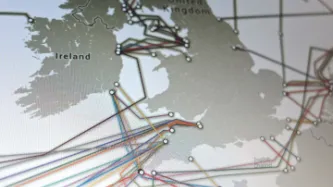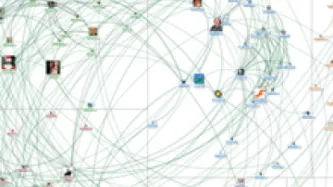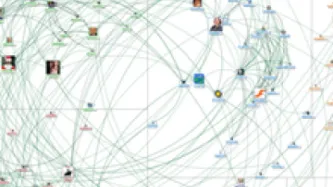Advanced Search
Content Type: News & Analysis
The development agenda is heralding a new cure-all for humanitarian and development challenges – data.
In the latest incarnation of the development world’s dominant paradigm, ICTs for Development, data is being embraced, analysed and monitored by companies, humanitarian organisations, aid donors and governments alike. Yet despite the promises of data evangelists that big and open data can revolutionise innovation, education, health care and infrastructure, the potential risks of…
Content Type: News & Analysis
For some time now there has been a need to update understandings of existing human rights law to reflect modern surveillance technologies and techniques. Nothing could demonstrate the urgency of this situation more than the recent revelations confirming the mass surveillance of innocent individuals around the world.
To move toward that goal, we’re pleased to announce today the formal launch of the International Principles on the Application of Human Rights to…
Content Type: News & Analysis
Barclays recently announced that they were looking to sell "aggregated" customer data to third parties. While the news sparked concern among the UK public, the practice, unfortunately, is becoming common among many industries.
A few months ago, it was revealed that Everything Everywhere appeared to be selling location and de-identified data to Ipsos MORI, who in turn made it available to third parties, which included offering it to the Police. Despite another…
Content Type: News & Analysis
Following reports that the Mexican prosecution authority appears to be not only using FinFisher, but also to be involved in a corruption scandal surrounding the purchase of this intrusive surveillance technology, the Mexican Permanent Commission (composed of members of the Mexican Senate and Congress) has urged Mexico's Federal Institute for Access to Public Information and Data Protection (IFAI) to investigate the use of spyware in Mexico.
The corruption scandal, which entails the…
Content Type: News & Analysis
Since mid-2012 the Hebrew University International Human Rights Clinic has been collaborating with Privacy International to produce research about the state of privacy laws and protections in Israel and worldwide.
Last week marked the launch of a long-anticipated pilot of a controversial Israeli biometric database, a project that has been the target of civil society protest and the subject of a challenge in the Israeli Supreme Court.
While there is no shortage of institutions maintaining…
Content Type: Long Read
Britain's spy agency, GCHQ, is secretly conducting mass surveillance by tapping fibre optic cables, giving it access to huge amounts of data on both innocent citizens and targeted suspects, according to a report in the Guardian.
Mass, indiscriminate surveillance of this kind goes against an individual's fundamental human right to privacy. The scope and scale of this program, which monitors the entire British public and much of the world, is neither necessary nor proportionate and thus,…
Content Type: News & Analysis
It is a long-standing privacy principle that an individual should have access to their personal information. This is particularly necessary in healthcare - after all there is nothing more personal than health information.
As the mass digitisation of health records increases, many issues arise about this access right. The right of 'subject access' comes with its own complexities. One challenge is that individuals can sometimes be compelled to conduct subject access requests in…
Content Type: News & Analysis
The following excerpt is from a posting in the Guardian's Comment is Free by Carly Nyst, Privacy International's Head of International Advocacy.
"In order to challenge a secret surveillance system, and to demand the government explains why it is spying on British citizens, one must apply to a secret tribunal that does not make public its proceedings or the reasons for its decision. It may seem like an Orwellian fantasy, but this is the stark reality of the British legal system.
It's called…
Content Type: News & Analysis
All across the U.S. on 4 July, thousands of Americans gathered at Restore the Fourth rallies, in support of restoring the Fourth Amendment of the U.S. Constitution and to protest the recently-disclosed information regarding NSA spying on American citizens. Demonstrations took place in over 100 cities, calling on the U.S. government to respect the privacy rights of citizens in America and individuals around the world.
With all this talk of constitutional …
Content Type: News & Analysis
Privacy International this week submitted stakeholder reports to the United Nations Human Rights Council1 about the human rights records of China, Senegal and Mexico. The reports, prepared in preparation with our partners in the respective countries, analyse the extent to which the right to privacy is respected and protected, and detail instances of privacy violations.
The stakeholder reports will inform the questions asked by members of the Human Rights Council when China, Senegal and…
Content Type: News & Analysis
In the wake of recent revelations about the NSA’s extensive surveillance powers over foreigners and American citizens, an ever-fuller picture of mass surveillance is being drawn in the US, the UK, and across the Western world. But what about clandestine surveillance practices in African states? How do they approximate or differ from those we’ve heard so much about in the last few weeks? A recent case from West Africa can help us begin to answer these questions.
In March,…
Content Type: Press release
A complaint filed with the Organisation for Economic Cooperation and Development (OECD) against Gamma International, a UK-based company accused of selling surveillance spyware for governments, will proceed and has been accepted for consideration, the UK National Contact Point (NCP) for the OECD announced.
The decision by the NCP is instrumental in the ongoing campaign to hold surveillance companies accountable for their products and the potential enabling of governments to commit human rights…
Content Type: News & Analysis
In an encouraging first response to our complaint against surveillance company Gamma International (Gamma), the UK National Contact Point (NCP) of the Organisation for Economic Cooperation and Development (OECD) announced that it will further investigate our claim against Gamma, as the evidence submitted appears to substantiate our allegations.
In February 2013, Privacy International, together with the European Center for Constitutional and Human Rights, Bahrain Watch, the Bahrain Center…
Content Type: News & Analysis
Trade has often been a positive driver in encouraging countries to adopt data protection laws, to ensure compliance and ability to conduct business with the European Union and other privacy-respecting partners. However, when free trade agreements are negotiated in secret and influenced by powerful business interests, the result is a severe watering down of existing privacy protections.
There is a high risk of this happening in the free trade negotiations between the European Union…
Content Type: News & Analysis
The government of Pakistan has repeatedly shown it is relentless when it comes to deploying measures to censor and spy on its own citizens. Today, a report released by Citizen Lab reveals another repressive tool being used to control and prevent information being accessed on the internet -- this time with help from the Canadian web-filtering company, Netsweeper.
According to the report "O Pakistan, We Stand on Guard for Thee: An Analysis of Canada-based Netsweeper’s Role in Pakistan’s…
Content Type: News & Analysis
Below is an excerpt of an article that recently appeared in Melbourne, Australia's The Age, written by Carly Nyst, Head of International Advocacy at Privacy International:
"Mass surveillance of a country's citizens by its government can no longer be said to be the preserve of authoritarian and dictatorial states.
The publication last week by The Guardian of classified National Security Agency documents has exposed the extent of surveillance by the US government, throwing into question…
Content Type: Long Read
Spy agencies have long sought to turn the technologies that improve all our lives against us. From some of the very first forms of remote communications such as telegraph cables, to modern-day means like Skype: if the spies can exploit it, they will.
And, as we’ve learnt over the last few months, the computer and mobile devices that millions of us own and carry around with us every day are no exception to this rule.
The smart phones, laptops, and devices that have changed how we communicate…
Content Type: News & Analysis
This post originally appeared on the blog for Association for Progessive Communications, written by Shawna Finnegan and Carly Nyst, for APCNews and Privacy International:
At the 23rd session of the UN Human Rights Council, the UN Special Rapporteur on freedom of opinion and expression, Frank La Rue, released his latest report – an analysis of the implications of States’ surveillance of communications on the exercise of the human rights to privacy and to freedom of opinion and expression.…
Content Type: Press release
In the wake of revelations that the UK Government is accessing wide-ranging intelligence information from the US and is conducting mass surveillance on citizens across the UK, Privacy International today commenced legal action against the Government, charging that the expansive spying regime is seemingly operated outside of the rule of law, lacks any accountability, and is neither necessary nor proportionate.
The claim, filed in the Investigatory Powers Tribunal (IPT), challenges the UK…
Content Type: News & Analysis
UPDATE: The Guardian has just reported that "The UK's electronic eavesdropping and security agency, GCHQ, has been secretly gathering intelligence from the world's biggest internet companies through a covertly run operation set up by America's top spy agency."
This recent news reveals a long-held suspicion that the GCHQ had the very powers they were seeking to place on a statutory footing with the Snooper Charter, a bill that was knocked back for being unnecessary and…
Content Type: News & Analysis
The revelations of the US government's massive and indiscriminate surveillance program are absolutely frightening, putting before the public's eyes the breadth of a secret, dragnet spying regime which casts every US citizen as a suspect.
The unearthing of this top secret court order shows that even in a country that prides itself on checks and balances, and is governed by the rule of law, that government and law enforcement agencies operate within a murky legal framework…
Content Type: News & Analysis
In a landmark report, the United Nations today has broken its long-held silence about the threat that State surveillance poses to the enjoyment of the right to privacy.
The report is clear: State surveillance of communications is ubiquitous, and such surveillance severely undermines citizens’ ability to enjoy a private life, freely express themselves and enjoy their other fundamental human rights. Presented today at the UN Human Rights Council session in Geneva, the report marks…
Content Type: News & Analysis
Compulsory data on every state school pupil in the country can now be used for research “promoting the education or well-being of children in England”, according to UK Department for Education.
The Department’s response to the highly worrying National Pupil Database (NPD), released in late May, is far narrower than previously suggested late last year, with none of the deeply troubling aspects being included in the final proposals, and existing definitions of terms…
Content Type: News & Analysis
A longer version of this article was previously published in Wired on 10 May 2013.
We all know surveillance is big in Putin’s Russia. What you may not know is that Russia’s surveillance tech is being used all over the world, even in the U.S.
The Kremlin is up to its domes in spy technology. One reason is fear, provoked by the Arab Spring, of a growing and diffuse protest movement that uses social media to organize. Notably, the authorities have taken an interest in DPI (…
Content Type: News & Analysis
Privacy International welcomes the absence of a Communications Data Bill in the Queen's Speech. The Communications Data bill was originally set to significantly expand the powers of communications surveillance in the UK and set another bad standard globally. Because of the work by Parliamentarians, a concerted effort by civil society groups and some within industry, this expansion was avoided, for now. However the Queen's Speech did include a mention of new proposals:
In relation…
Content Type: News & Analysis
We very much welcome today's announcement by Health Secretary Jeremy Hunt that people will be allowed to opt out of having their medical records shared in the NHS England centralised information bank.
The move is an important one for data privacy and patient choice, and has been a key objective of Privacy International in our collaboration with the new medConfidential (which launched yesterday). A month ago, NHS England (and the Director of…
Content Type: News & Analysis
The current iteration of the UK's "Communications Data Bill" is now dead.
Privacy International has been working closely with others behind the scenes to work on understanding what little case there was, and fundamentally demolishing it.
The UK Government is now examining a "middle way" for the legitimate law enforcement access of communications data. Working with others around the world, we have a few principles that should be considered.…
Content Type: News & Analysis
After a successful investigation by the US government into the illegal reselling of over a million dollars worth of surveillance equipment to the Syrian regime, Dubai distribution company Computerlinks FZCO has agreed to pay the maximum civil penalty of $2.8 million.
Computerlinks, in three separate transactions between October 2010 and May 2011, sold $1.4 million worth of devices developed by California-based Blue Coat to the state-run Syrian Telecommunications Establishment, which…
Content Type: News & Analysis
Out of concern for the potential international ramifications of the Communications Data Bill, fifteen of Privacy International's partner activists and organisations have signed a joint letter urging the UK to consider the detrimental impact this law will have around the world.
The letter reads:
Dear Editor,
The United Kingdom’s proposed Communications Data Bill is not only sinister in its intention to enable the UK government to monitor and control the internet, but it is ill-…
Content Type: News & Analysis
Privacy International welcomes the news that the UK NHS Data Spine is being replaced. We have fundamental privacy concerns about the existing infrastructure, and the proposed changes have the potential to enable the necessary privacy protections to be implemented in a meaningful way.
Core elements of the NHS Spine, the technological infrastructure underpinning the Service that cost the Government over £12 billion pounds, will be have to be replaced after numerous failures. The…


























